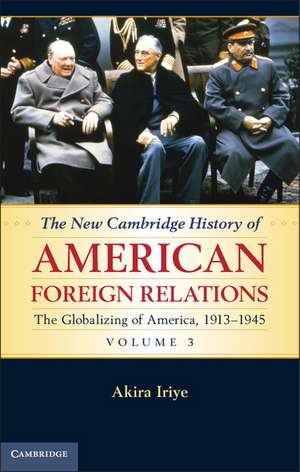The New Cambridge History of American Foreign Relations: The New Cambridge History of American Foreign Relations
Autor Akira Iriyeen Limba Engleză Hardback – 28 apr 2013
Preț: 366.09 lei
Nou
Puncte Express: 549
Preț estimativ în valută:
70.05€ • 72.96$ • 58.40£
70.05€ • 72.96$ • 58.40£
Carte tipărită la comandă
Livrare economică 28 martie-11 aprilie
Preluare comenzi: 021 569.72.76
Specificații
ISBN-13: 9780521763288
ISBN-10: 0521763282
Pagini: 266
Dimensiuni: 158 x 235 x 21 mm
Greutate: 0.52 kg
Ediția:Revised
Editura: Cambridge University Press
Colecția Cambridge University Press
Seria The New Cambridge History of American Foreign Relations
Locul publicării:New York, United States
ISBN-10: 0521763282
Pagini: 266
Dimensiuni: 158 x 235 x 21 mm
Greutate: 0.52 kg
Ediția:Revised
Editura: Cambridge University Press
Colecția Cambridge University Press
Seria The New Cambridge History of American Foreign Relations
Locul publicării:New York, United States
Cuprins
1. The age of European domination; 2. The Great War and American neutrality; 3. The United States at war; 4. The Versailles peace; 5. The 1920s: the security aspect; 6. The 1920s: the economic aspect; 7. The 1920s: the cultural aspect; 8. The collapse of international order; 9. Totalitarianism and the survival of democracy; 10. The emergence of geopolitics; 11. The road to Pearl Harbor; 12. The global conflict.
Recenzii
'A clear overview of American ascendance - cultural, military, and economic - in an era punctuated by war and economic crisis. Iriye's global perspective helps us understand the rise of the United States in the context of wider challenges to European power; his analysis of deglobalizing forces and reglobalizing efforts casts new light on American leadership in this tumultuous time.' Kristin Hoganson, author of Consumers' Imperium: The Global Production of American Domesticity
'No one has done more than Akira Iriye to promote the study of U.S. foreign relations in a global frame that includes civil society actors and institutions. Skilfully bridging the domains of politics, economics, and culture, The Globalizing of America, 1913–1945 charts the United States' interwar rise as a world power largely defined by its pursuit of economic interdependence, in the context of global crises and struggles over the nationalizing and internationalizing of power. Far from isolated in the decades prior to World War II, he shows that the United States possessed a growing presence abroad, particularly in the fields of investment, commerce, philanthropy, education and popular culture, that would come to transform both the world and the United States itself.' Paul A. Kramer, author of The Blood of Government: Race, Empire, the United States, and the Philippines
'Iriye has no peer as an international historian, as attested to by this revision of his third volume of The Cambridge History of American Foreign Relations. With command and complexity he highlights America's role from the First World War to the end of the Second in restructuring the global system without neglecting the agency of other states and non-state actors. The Globalizing of America, 1913–1945 is history at its best: a multidimensional study of power that is as accessible as it is challenging.' Richard H. Immerman, Temple University, Philadelphia
'Akira Iriye's volume, now updated with recent scholarship, continues to represent the best of historical interpretation and writing on its period. Scholars and students will continue to benefit from the provocative insights and graceful style of America's most distinguished international historian.' Emily S. Rosenberg, editor of A World Connecting, 1870–1945
'No one has done more than Akira Iriye to promote the study of U.S. foreign relations in a global frame that includes civil society actors and institutions. Skilfully bridging the domains of politics, economics, and culture, The Globalizing of America, 1913–1945 charts the United States' interwar rise as a world power largely defined by its pursuit of economic interdependence, in the context of global crises and struggles over the nationalizing and internationalizing of power. Far from isolated in the decades prior to World War II, he shows that the United States possessed a growing presence abroad, particularly in the fields of investment, commerce, philanthropy, education and popular culture, that would come to transform both the world and the United States itself.' Paul A. Kramer, author of The Blood of Government: Race, Empire, the United States, and the Philippines
'Iriye has no peer as an international historian, as attested to by this revision of his third volume of The Cambridge History of American Foreign Relations. With command and complexity he highlights America's role from the First World War to the end of the Second in restructuring the global system without neglecting the agency of other states and non-state actors. The Globalizing of America, 1913–1945 is history at its best: a multidimensional study of power that is as accessible as it is challenging.' Richard H. Immerman, Temple University, Philadelphia
'Akira Iriye's volume, now updated with recent scholarship, continues to represent the best of historical interpretation and writing on its period. Scholars and students will continue to benefit from the provocative insights and graceful style of America's most distinguished international historian.' Emily S. Rosenberg, editor of A World Connecting, 1870–1945
Notă biografică
Descriere
This third volume of the updated edition describes how the United States became a global power during the period from 1913 to 1945.






